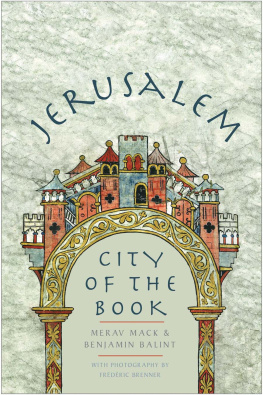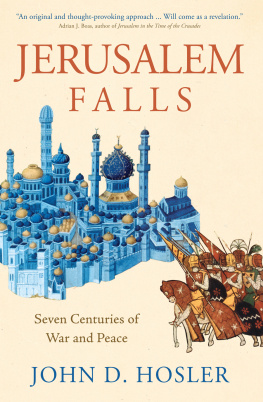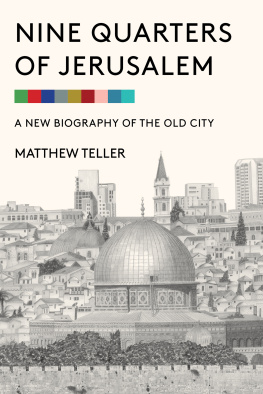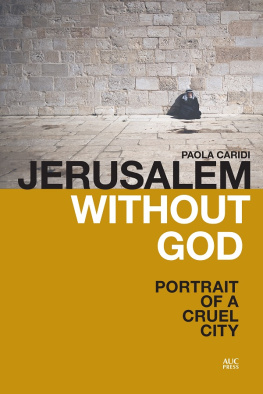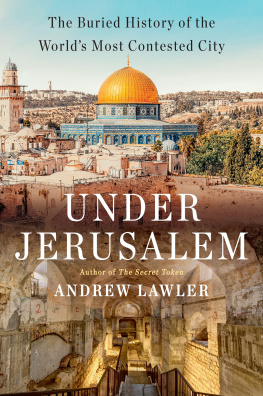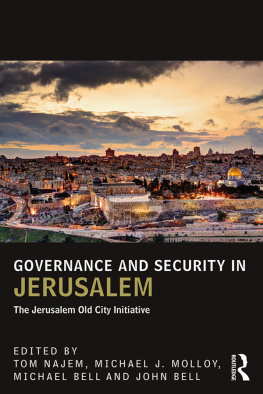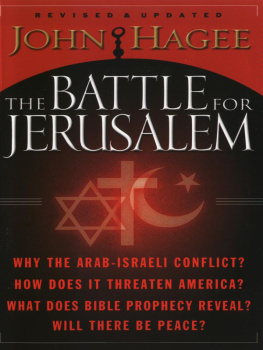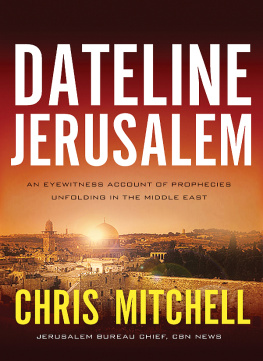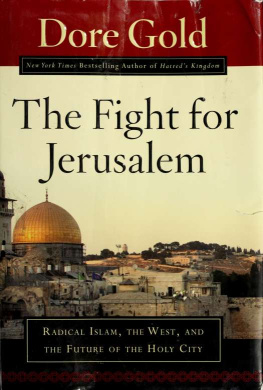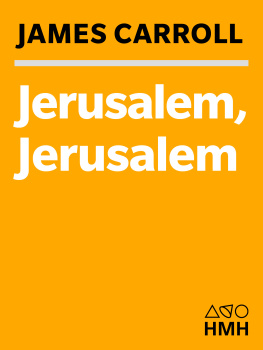
JERUSALEM

Published with assistance from the foundation established in
memory of Calvin Chapin of the Class of 1788, Yale College.
Copyright 2019 by Merav Mack and Benjamin Balint.
All rights reserved.
This book may not be reproduced, in whole or in part, including illustrations, in any form (beyond that copying permitted by Sections 107 and 108 of the U.S. Copyright Law and except by reviewers for the public press), without written permission from the publishers.
Color plates courtesy of Frdric Brenner / Howard Greenberg Gallery.
Yale University Press books may be purchased in quantity for educational, business, or promotional use. For information, please e-mail (U.K. office).
Set in Baskerville type by IDS Infotech Ltd.
Printed in the United States of America.
Library of Congress Control Number: 2018959044
ISBN 978-0-300-22285-2 (hardcover : alk. paper)
A catalogue record for this book is available from the British Library.
This paper meets the requirements of ANSI/NISO Z39.48-1992 (Permanence of Paper).
10 9 8 7 6 5 4 3 2 1
CONTENTS

From Mamluk Patronage to Ottoman Occupation:
The Thirteenth to the Nineteenth Century
JERUSALEM
PROLOGUE

I have always imagined that Paradise will be a kind of library.
Jorge Luis Borges
The people of Jerusalem have since antiquity shared a passion for the written word. Yet to this day much of the citys written heritage conceals itself in libraries and archives to which only a few are granted access. What might it mean to see Jerusalem, with its daily encounters between people of diverse faiths and cultures, as a city of the book? Is it possible to use libraries and texts to capture the citys tragedy and its magnificence, to tell the story of a place where some of the worlds most far-reaching ideas were put into words, translated into poetry and prophecy?
For all their impermanence and portability, books serve as transmitters of culture; they often outlive many owners. The medieval Hebrew poet Moshe Ibn Ezra called them briefcases of wisdom. Jerusalems diverse communities have been bound by a shared reverence for the written word, and each one put down an anchor in the soil of the earthly Jerusalem. Each of these peoples of the book curated its memory through the written word and used texts in the search for origins and authenticity. And they each, in their way, suffused Jerusalem with their collective dreams, deposited in libraries, thrown into boxes as scraps, hidden between the covers of worm-eaten tomes, brought back from exile, or secreted by librarians, forgers, and thieves. If we listen carefully the citys texts (and their custodians) can tune us in to Jerusalems resonancesancient and modern, lofty and lowlyand to the relationship between the actual city of Jerusalem and the fateful fantasies it continues to inspire.
This is the story we set out to tell in this book: it is not a systematic history of Jerusalem as such, much less a political history, but an essay into how Jerusalem has been imagined, made legible, and shelved in libraries. Rather than attempt to survey, catalogue, or discover unknown manuscripts in the dozens of archives and libraries we visited, we use the history of the collections themselves to excavate the richly layered history of the city and its cultural exchanges and to tell the untold history of how the peoples of the book have populated the city with books.
Like a city, a library is a form of sometimes uneasy cohabitation. We came to see a library, however ordered or disordered, from the humblest to the most venerable, not as simply a collection of books but as an invitation to imagine, a summons toward people, places, and possibilities that we can see only in the minds eye. A place that both encompasses and mirrors us, a library allows us to bridge the distance between what we see and what we want to see.
As the product of collective imagination Jerusalem has inspired its own wishful literary mode. To make it legible we look both at its books as physical objects and at what is written in those booksas well as at the connections between the two. We consider the category of the library to encompass not just a collection of books but a corpus of shared texts. We wonder at how the imagined city has inspired textsprayers, apocalyptic fantasies, guidebooks, architectural plansthat have flowed outward and then ebbed back to wash over the earthly city. The battles of those who have laid claim to Jerusalem since its inception can be seen through the battles over and within their books, and so can the many forms of reconciliation. We examine how the city rescued its wisdom despite the flames that consumed its libraries and memories in numerous wars fought over more than three millennia. Finally, we ask how Jerusalem can shed light on the transformations in the technology and meaning of the written wordas momentous as the move to print, and perhaps even more so. Above all, we inquire into not only what kinds of texts Jerusalem has produced but also what kinds of Jerusalem its texts have created.
In looking for material traces of the written word, we glimpse Jerusalems profound antinomies, within a city perched between East and West, antiquity and modernity, violence and piety. Awash with memory, Jerusalem is a place both real and imagined. The earthly city, a mundane metropolis of decadence and decay, is tethered in the imagination to the symbols of timeless Jerusalem: a city of liturgy and song, an omphalosa place touched by the divine where heaven and earth are said to meet that has no need of the sun or of the moon to shine in it, for the glory of God illuminated it (Revelation 21:23). How can viewing Jerusalem through its libraries, past and present, shed light on the gap between the abidingly real and the fancifully imagined, or on the ways that gap has been bridged?
Jerusalem has given birth to some of the worlds greatest literature, yet the writers of Jerusalem, though renowned the world over, are not usually thought of as a distinct school; their story as Jerusalemites has never been woven into a single narrative. In some cases, their fame has grown so great that their connection to the city has receded into oblivion: David, Solomon, and Isaiah of the Bible; Josephus, Jerome, and Empress Eudocia of late antiquity; al-Ghazali and Ibn Arabi of the Sufi tradition; the historians al-Muqaddasi and Mujir al-Din. Their writings emanated from Jerusalem to the four corners of the known world.
The kings and queens of Jerusalem entered into our memory not only because of their valor in battle or the monuments they commissioned but also because of the texts they composed and inspired. Some of their words ignited wars; others prompted reflections on compassion and peace. In both cases, the celestial city has left indelible traces in the earthlyeven provincialcity, all too often turning it into a screen onto which millennial fantasies were projected.
King Solomon, son of David, purportedly both set and set down his erotic poem the Song of Songs in Jerusalem, and beautiful copies of the Song can be found in many of Jerusalems libraries, though none as richly decorated as the ones kept in the library next door to Saint Philippos Ethiopian church. The Song of Songs tells of a Lover and her elusive Beloved who seek each other: I adjure you, O daughters of Jerusalem, if you find my beloved, what will you tell him? That I am love-sick (5:8). Who are the lovers of Jerusalem, within the city and from afar, and in what ways do they seek to possess it? How jealous and possessive is their love, how ennobling or full of folly, and how far are they willing to go to consummate it? In this book we tell the stories of Jerusalems poet-librarians and through them the story of Jerusalem afresh. The true lovers of Jerusalem, we came to see, are the custodians of its written words.
Next page
